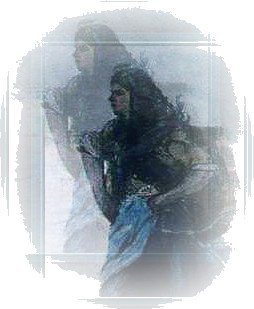

  Close this Window 
|

|
| Margaret: | There's been a death. |
| Joseph: | It must be the Bright's child what was sick. |
| Ann: | Or the Morley child what was sick. |
| Sarah: | (pale) What child? |
| Martha: | Or Mrs Quaid, what's been lying ill in the infirmary for days on end. |
| John: | There, they bring the body. |
| James: | It's a child. |
| Harry: | It's a child's body. |
| Martha: | She was a wee woman. It's Mrs Quaid. |
| Thomas: | It's a child's body. |
| Kathleen: | (turning to audience, speaking to self, frightened) It's a poor child's body I'll be thinking, and how the tormented thing lay shrinking on its bed for days, till the doctor came and pronounced it dead. The child is dead, he said. There's no hope now. The child is dead and no matter what may come of life ahead, they'll always say, we had a child dead at sea. |
A voice offstage is heard reciting prayers.
| Voice: | Man that is born of a woman hath but a short time to live, and is full of misery. He cometh up, and is cut down, like a flower; he fleeth as it were a shadow, and never continueth in one stay. Forasmuch as it hath pleased Almighty God of his great mercy to take upon himself the soul of our dear brother here departed, we therefore commit his body to the deep, to be turned into corruption, looking for the resurrection of the body - when the Sea shall give up her dead - (Margaret's next speech begins here) and the life of the world to come, through our Lord Jesus Christ; who at his coming shall change our vile body, that it may be like his glorious body, according to the mighty working, whereby he is able to subdue all things to himself. |
| Margaret: | We had a child dead at sea. I remember the white canvas. The sailors hanging from the shrouds above. The sea ruby red with sunset. Our days are like the waves, the waves, the waves. And the tiny body slipped through the scuttle as the sun sank. The child is dead, he said, and no matter what may come of life ahead, they'll always say, we had a child dead at sea. |